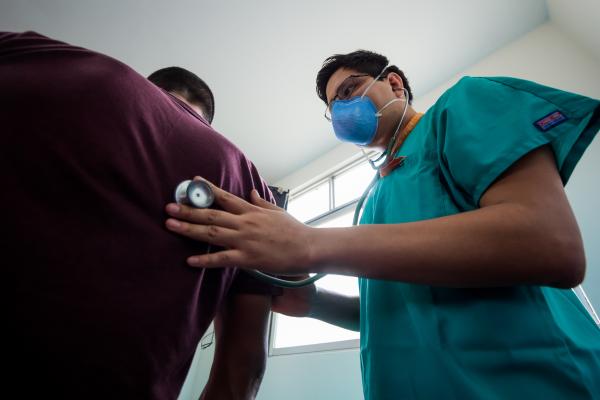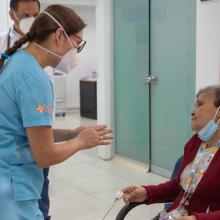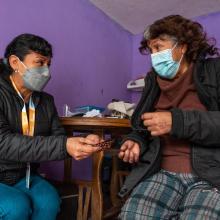In the 1990s, Peru was renowned for its national tuberculosis (TB) control program. However, the Socios En Salud team detected a serious contradiction: many people were still getting sick and transmitting the disease, despite receiving treatment.
To address this crisis in Carabayllo - one of Lima’s most impoverished districts - an innovative strategy was implemented that achieved the recovery of 75 people with multidrug-resistant tuberculosis (MDR-TB), a more complex and difficult-to-treat form.
This milestone demonstrated that it was possible to beat TB even in contexts of extreme poverty, and served as key evidence for the World Health Organization (WHO) to update its treatment protocols globally.
Since then, Socios En Salud (SES) has held a conviction: research is the most powerful tool for transforming care for TB and other neglected diseases.
But what does TB research involve? Why is it so urgent in countries like Peru? And what are the most promising advances? Here we tell you.
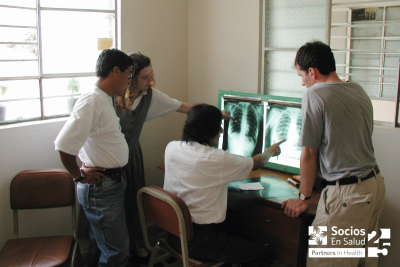
Primeros estudios de tuberculosis multirresistente liderado por Socios En Salud, Perú.
What is TB research and why is it important?
TB research is a dynamic field that seeks to improve prevention, diagnosis and treatment. It aims to generate scientific evidence to understand how the disease is transmitted, what its impact on public health is, and what interventions are most effective in stopping it.
Its development is vital because TB remains the most lethal infectious disease, with more than 10 million cases a year. In countries such as Peru, it makes it possible to overcome access barriers, strengthen health policies and facilitate innovative therapies, especially for populations in vulnerable situations.
Why is SES involved in TB research?
SES understands that TB research is an urgent public health need. As an organization committed to system strengthening, it is focused on generating evidence to improve diagnosis, treatment and access to care.
Thus, it conducts research to optimize access to effective diagnostics and therapies, assesses the impact of social determinants on TB, and generates key information to update guidelines and policies, seeking to make them more equitable and effective in controlling the disease.
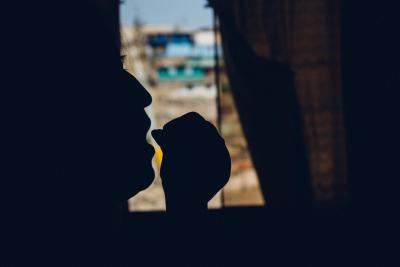
En Perú, alrededor de 52 mil personas contraen tuberculosis cada año. Investigar la enfermedad es una necesidad urgente de salud pública.
Foto de SES
How and what is the approach SES develops in its TB research?
With international partnerships and a dedicated team, SES generates knowledge that transforms care and influences global policy. Beyond laboratories, it works directly with communities to address their social determinants, ensuring a comprehensive approach to research.
Its research spans two areas:
Clinical research: evaluation of new strategies for diagnosis and treatment, including clinical trials on innovative drugs and drug resistance.
Epidemiological research: study of TB transmission and the impact of social determinants, such as access to health services and mental health.
SES follows high ethical standards at every stage of its research. With a process that spans from recruitment to outcome evaluation, it prioritizes equity, safety and community involvement, supported by its own Institutional Research Ethics Committee (IRB - SES).
In addition, its Community Advisory Committee (CAC-SES) provides valuable feedback to improve the effectiveness of research, adapting it to the needs and socio-cultural context of the communities.
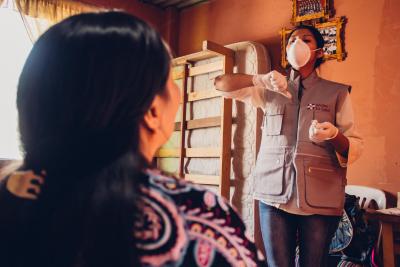
Más allá de los laboratorios, Socios En Salud trabaja con las comunidades, fortaleciendo la salud desde las poblaciones más vulnerables.
Foto de SES
What are the most relevant findings of SES TB research?
endTB: international clinical trial that tested more effective treatments for resistant TB. Three of the evaluated regimens have already been implemented by the Ministry of Health (MINSA) and recommended by WHO for MDR-TB treatment.
EPI-TB: prospective study in collaboration with Harvard University and MINSA, which followed more than 18,000 people in Lima to understand the transmission dynamics of TB and MDR-TB. Vitamin A deficiency was found to significantly increase the risk of developing TB.
Post-TB Lungs: research with Harvard University and other institutions that evaluated diagnostics and therapies for people with post-TB lung disease. As a result, a care guideline was developed and incorporated into the MINSA technical standard.
TB Mobile/Backpack TB: an innovative project that uses a combination of digital radiography, artificial intelligence and molecular tools to rapidly detect TB in hard-to-reach populations. It has optimized detection and linkage to treatment in vulnerable communities.
Stop TB: project focused on improving the implementation of TB preventive therapy in at-risk populations. Barriers in access and adherence to treatment were identified and interventions were designed to improve uptake and coverage.
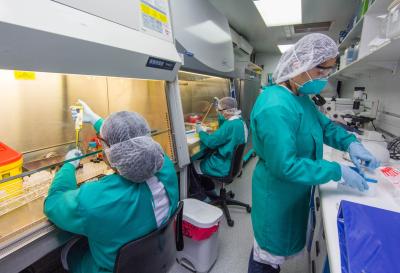
Socios En Salud trabaja en investigación clínica y epidemiológica para mejorar la salud pública y los tratamientos.
Foto de SES
Use of TB LAM: implementation of the TB LAM test at the Policlínico de Socios En Salud, the only center in Peru to offer it. This diagnostic test, recommended by the WHO, improves TB diagnosis in people with advanced HIV and other vulnerable groups.
Pos-TB Teens and Predict TB Teens: ongoing research addressing the specific challenges of adolescents in TB treatment. Pos-TB Teens studies post-treatment issues, while Predict TB Teens looks at factors affecting treatment adherence.
PHOENIx: a study funded by the U.S. National Institutes of Health that seeks to develop preventive therapy for people exposed to MDR-TB. Socios En Salud is participating in the enrollment of participants in Peru.
Research pipeline: SES participates in networks such as SMART4TB and UNITE4TB, in the development of new clinical trials related to tuberculosis.
Where can SES scientific publications be consulted?
All research is available at: SES Research Library.
Be part of the change. Get our actions, stories and opportunities to transform lives in your inbox. Subscribe hereand join our movement for health!
.
